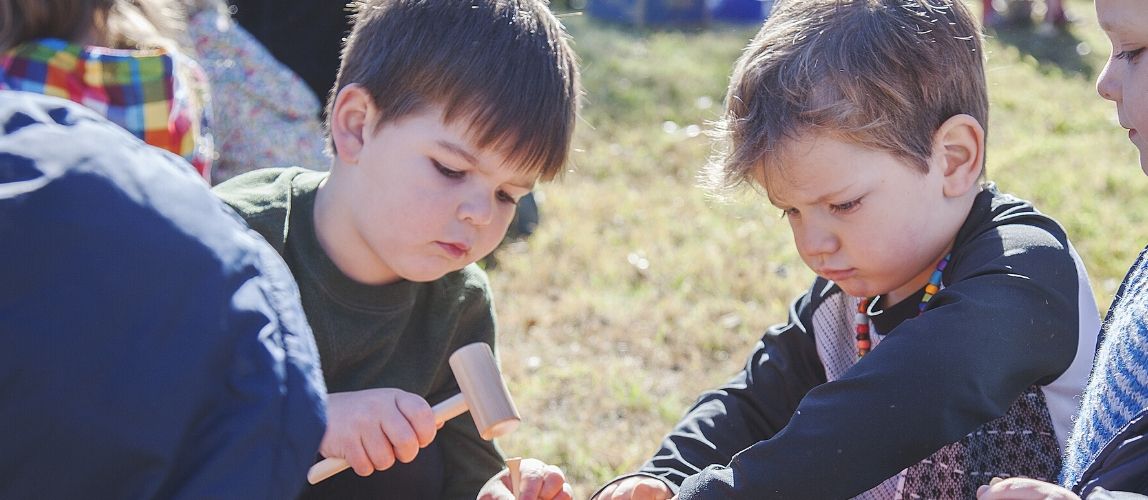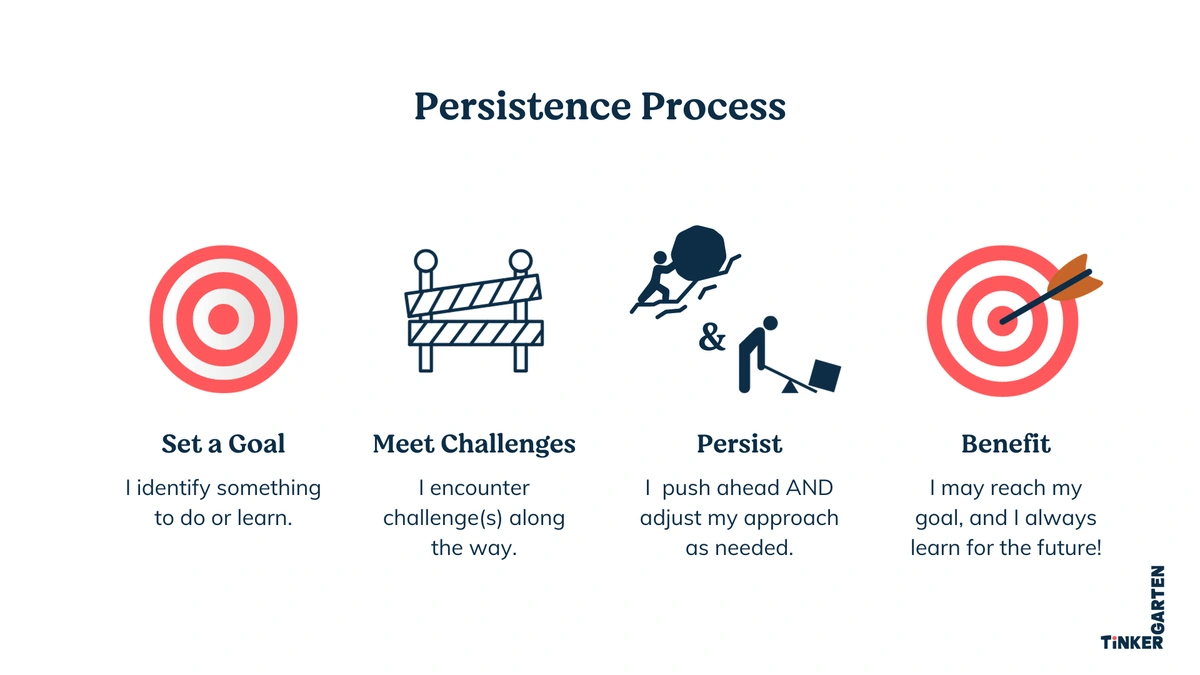Developing persistence in our kids has become a much sought-after goal for parents and teachers alike. This is especially true after we’ve all had to persist through a once-in-a-lifetime pandemic. Grownups are also wrapping our heads around the gaps in resilience we observe among far too many young adults. Making sure children learn to persist in pursuit of learning and of whatever goals they set for themselves feels more important than ever.
What do we mean by persistence?
At Tinkergarten, we think about persistence as the ability to set a goal, then both push ahead AND adjust as we meet challenges. If we do can stick with it and stay flexible, we benefit no matter what. We may reach our goals, but even when we don't, we learn and grow.
That last bit may actually turn out to be the most important lesson. Persisting is not about achieving exactly what you set out to do. Quite often, things don't turn out as we intended, but if we focus on learning, we'll grow no matter what!
When we talk with kids about it, it can help to show a picture and present persistence as a process or way of approaching learning and life. Kids may not think about setting goals, but they are nearly always trying to do or learn something new. And, whenever we're attempting something new, especially when we are still growing, we inevitably meet challenges. That's when persistence kicks in! And, persistence is a combination of pushing ahead and adjusting our approach—all in the service of reaching our goals and learning.
When can we teach persistence?
Babies are born remarkably persistent, and we can nurture persistence as kids grow by attuning them to the persistence process and letting them lead their own process. Playful learning is a great context for this. When we give kids the chance to try to do or learn new things, allow them to struggle a bit, then support them as they decide how to push ahead and/or adapt their approach, we give them the practice they need to build their persistence muscles. Along the way, they also learn how to manage and even grow through setbacks and disappointment.
What is grit?
In our work with kids, we also consider a related inner quality called “grit.” The definition of grit, says psychologist Angela Duckworth, is “passion and perseverance for long-term goals.” Duckworth studied how people fared in challenging situations, from cadets entering West Point to new teachers in struggling communities. Across all, grit was the significant predictor of their success.
Listening to Duckworth speak about her research, you’ll likely come to see that grit is more than just “stick-to-it-iveness,” although that is part of it. It’s about passion, genuine interests, and motivation that comes from within. Grit also involves learning, seeing setbacks as opportunities, and responding to challenges in pursuit of something you love. It’s what people need to reach for their dreams.
The people studied in grit research were older than children. But, kids start building a foundation for this characteristic at birth. Infants, toddlers, and preschoolers have no shame and very little fear of failure.
Without persistence and true tolerance for setbacks, humans would never walk, talk, climb, run, or even learn to nurture close relationships. Small humans are designed to try, fail, revise, repeat—all in order to learn. It’s often an adult's reaction to their setbacks that leads a child to associate failure with loss or lasting disappointment. So, the early years are a perfect time to hold back our reactions, let them push themselves, and promote grit in kids.
Being mindful of the limitations of grit.
Whenever we talk about grit or persistence, it's important that we remember no one factor determines success. Like all things, our ability to exert grit or demonstrate persistence are impacted by the level of privilege we are afforded based on our identities. The concept that, "if we work hard, we will have success" does not apply equally to all kids. All kids need to develop both genuine interests and the ability to persevere in the face of obstacles in pursuit of their goals, but we have to be careful not to assume that grit alone levels an uneven playing field.
How can we help kids develop persistence and grit? Our top ten promising practices:
Start with ourselves! Ask yourself, how gritty am I?:
Test yourself on Angela Duckworth’s grit scale. Taking time to think about the role that grit has played in your life can also help you support early grit development in your kids.
Let kids drive their own play.
If kids can have lots of space and time to take play in any direction, they’ll be much more likely to identify and hone their interests—and interests are seeds that sprout true passions.
Let creatures be teachers.
In Tinkergarten lessons, kids learn all kinds of lessons by observing and pretending to be other living things. The natural world is full of examples of species who have evolved unique ways to persist and, in turn, thrive.
Provide activities designed to promote persistence—Come to Tinkergarten!
Our Winter 2024 curriculum series is engineered specifically to help kids develop persistence and grit. Each weekly lesson features a different "animal superhero" and supports kids ages 1.5 to 8 in working on a unique aspect of persistence. Learn more about all we'll be learning.
Families can complete the curriculum on their own using Tinkergarten Home. Or, in hundreds of communities, families can join local classes facilitated by a Tinkergarten Teacher. See if there are groups near you in our TG Teacher Directory.
And, teachers can teach the curriculum in their classrooms, communities, homeschooling practices and more. Learn more here.
Surround kids with tales of persistence.
Stories of creatures and people who model the persistence process also help kids understand and learn to persist. Check out "How to Nurture Kids' Grit with Great Books" for a list of our favorite titles.
Promote pretend play in particular.
What does pretending have to do with persistence and grit? When kids pretend, they develop cognitive flexibility—the ability to bend the rules, imagine new worlds and substitute one idea for another. Part of working your way around obstacles in life is thinking and acting flexibly. So, pretending can actually help kids prepare.
Reframe problems as “desirable difficulties.”
It’s hard to watch our children suffer or experience frustration, but it’s helpful to ask ourselves, “When is frustration really suffering, and when is it a means to learn?” When you ask that question, you can start to spot “desirable difficulties”—a concept developed by Robert and Elizabeth Bjork at UCLA and made popular in Malcolm Gladwell’s book, David and Goliath.
According to the Bjorks' research, when a task is made easier, it does not result in more learning. Rather, when learners experience an appropriate level of challenge, they “turn on.” The challenge becomes a way to get better at the task at hand and to learn to be both flexible and, you guessed it, gritty.
Trust kids to tell you what’s too challenging.
Young children are rather good at knowing when too much is too much. But a little frustration is good practice for life. So let them give challenge a try. For example, if your child decides to try to drag a log four times her size, let her go for it. Through persisting a bit, she’ll learn a thing or two about physics as well as her own limits. If you encourage her not to try, she’ll only learn that you don’t believe she can do it. If she gets stuck or appears sad when thwarted, you can always suggest she try again when she is taller or stronger, or you can offer to team up and see what happens together.
Notice and honor effort.
Think about how you praise, and look for every opportunity to value effort over achievement (avoid praising talent or “smarts”). When you see a child put real effort into something, especially if they struggle and persist, describe the child’s actions to them and stress the learning. For example, “I saw that your stone tower kept falling over, but you switched the blocks and kept going. What did you learn about building towers from all of those falls?”
Practice grit and let your kids see.
One of the most powerful ways to nurture grit in our children is to model it ourselves. Identify a pursuit that you really love and at which you can always get better. Maybe it's baking bread, tending to plants, playing an instrument or teaching a particular skill that you find really interesting but also find challenging.
Share with the kids you love or teach how you love your passion task as well as ways you find it challenging. Teach grit when you hit a challenge by talking about it with kids in terms of what you've learned and what you think you'll try instead next time.




